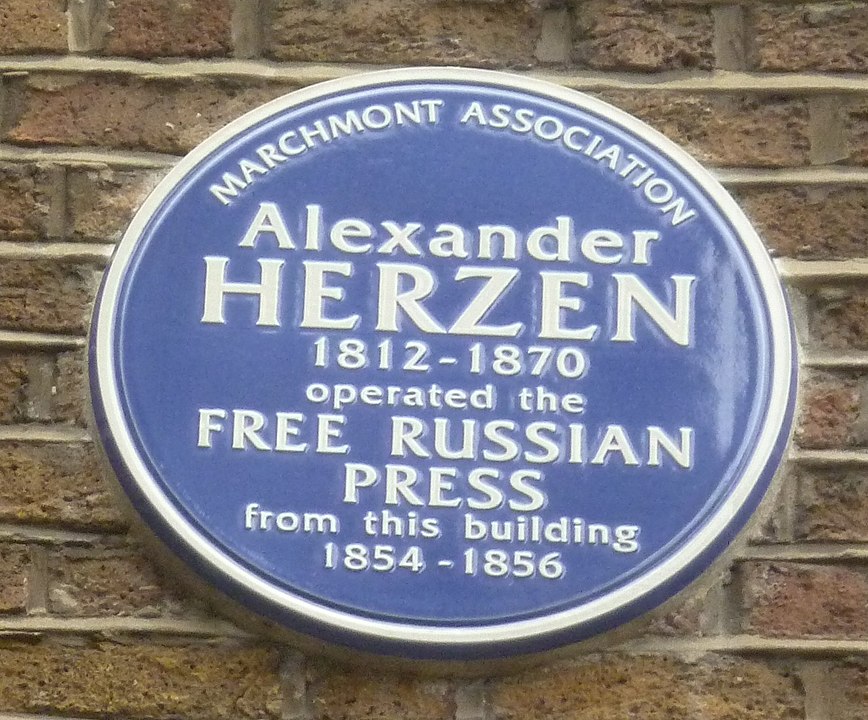The European revolutions of 1848, which attempted to establish socialist systems of government and economics, didn’t spring up out of nowhere. Neither did the Narodniks, who were members of an agrarian socialist movement in Russia in the 1860s and 1870s. Narodism wasn’t the only socialist movement in Tsarist Russia, either; the Socialist Revolutionary Party was a large and pretty powerful movement there between about 1900 and 1920. The Trudoviks formed as an offshoot of the Socialist Revolutionary Party around 1906 and won seats in the State Duma, which was a national assembly created by Tsar Nicholas II after the 1905 Revolution in Russia (he remained as the Tsar after that one, though).
One of the founders of agrarian socialism in Russia was Alexandr Herzen, who was born roughly a century earlier: April 6, 1812. He was the son of a rich Russian landowner, but was illegitimate. Nevertheless his father gave him the name Herzen because he was a “child of his heart” (“herz” is the German word for heart). He was born in Moscow just before the invasion by Napoleon’s army.
Herzen’s father had very highly-placed contacts in both the Russian and the French governments, and even met personally with Napoleon. Possibly because of that, as well as their wealth, the family survived the conflict with no apparent danger, and Herzen completed his studies at Moscow University in 1834.
At that point things may have begun to change for Herzen, when he and his friend Nikolay Ogarev attended a festival. While they were there, music composed by composer Mikhail Sokolovsky was played. Sokolovsky was a critic of the Tsar. Although all the pair did was hear the music (assuming they even did), they were arrested and banished to a distant town in northeastern Russia: Vyatka (nowadays it’s called Kirov). He remained there for a dozen years until Grand Duke Alexander (the Tsar’s son, and the future Tsar Alexander II) intervened and allowed him to leave. He moved to Vladimir, about 100 miles east of Moscow, and became the editor of the newspaper.
Two years later Herzen was completely cleared, and could return to Moscow, which he did. He even got a government job. However, at work he had the temerity to complain about a police brutality incident, so they exiled him again, this time to Novgorod, back to northeastern Russia. He was, though, able to hold on to his government job.
His life changed again in 1846 when his father died and left him the family fortune, which was evidently substantial. The next year he took his wife and children to Italy. It may have initially been a pleasure trip, but he never returned to Russia. He heard about the French Revolution of 1848 and went to Paris, then to Switzerland. The Tsar initially froze his assets in Russia, but Baron Rothschild himself intervened (like his father, Herzen evidently had highly-placed contacts).
In 1851 Herzen’s wife died of tuberculosis and he moved to London, where he stayed for over a decade. He continued his writing, and founded the Russian Free Press there in 1853, which he hoped would help influence Russia from afar by publishing socialist books and journals. They didn’t sell a single copy of anything for the first three years, but after Nicholas I died in 1855 the Russian Free Press editions were smuggled into Russia in huge quantities, and also sold well throughout Europe. He also published a well-circulated Russian journal called The Bell. Herzen’s hope that his publications would influence Russia were borne out.
He also founded the International Workingmen’s Association, the first attempt ever made to unite all the socialist, communist, and anarchist groups involved in the international working class movement. At that point, of course, he wasn’t a working man himself, if he ever had been. Nevertheless, he dedicated himself to that cause. Maybe growing up under an authoritarian regime thin-skinned enough to deport him over hearing the wrong music had something to do with it.
His old friend Nikolay Ogarev joined him in London in 1856, and they must have been very good friends indeed — Ogarev’s wife left him for Herzen, Ogarev remarried, Herzen and Ogarev’s ex had three children together, and they all stayed friends.
Herzen was the first independent Russian political publisher, and his many publications helped shape the rise of the working class movement worldwide. His ideas of an agrarian collectivist social structure never came to fruition in the face of the industrial revolution, and real revolutionaries though he was “too soft,” partly because while he had supported the 1848 movements, he despised their attempts to establish governing systems. He was afraid of modernization, particularly in Russia, and warned about “Genghis Khan with a telegraph.” He met Leo Tolstoy, who said he never met anyone “with so rare a combination of scintillating brilliance and depth.” Isaiah Berlin, the 20th-century philosopher, regarded Herzen as a personal hero, and featured him in a 1978 essay collection titled Russian Thinkers. The key aspect of Herzen’s thought that Berlin focused on was that human lives should not be sacrificed to abstractions or imagined future events. Herzen and Berlin’s works were the inspiration for The Coast of Utopia, a set of three plays by Tom Stoppard. They were performed in London in 2002 and New York in 2006 and 2007. Herzen also wrote an autobiography, which Berlin described as “one of the great monuments to Russian literary and psychological genius, worthy to stand beside the great novels of Turgenev and Tolstoy.”
Herzen returned to Geneva from London in 1864, and died of tuberculosis on a trip to Paris in 1870. He’s buried in Nice. His London House on Judd Street still exists, and is marked with a plaque.

By Kim Traynor – Own work, CC BY-SA 3.0, https://commons.wikimedia.org/w/index.php?curid=28593481
